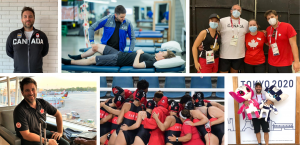Félix Croteau

Photo credits : Photo courtesy of Félix Croteau / INS Québec
Professional background
Profession: Physiotherapist
Olympic Games: Tokyo 2020
Tokyo 2020 Sport: Water Polo
Q. Was there a specific time in your life when you said to yourself that you wanted to work with high performance athletes or who would be going to the Olympics?
A. “When I was a teenager I discovered physiotherapy after a football injury. I remained deeply impressed with the impact that these interventions had on my ability to return to the game. I followed a path thereafter to gain experience with sports teams as much as possible to give back to others because it had been so positive for me.”
Q. How was the training and preparation abroad for the Games with the water polo team? How is your teamwork with your colleagues Alain Delorme and Véronique Richard?
A. “Alain (Lead Strength and Conditioning Trainer), Véronique (Mental Performance Consultant) and I have been working together with the water polo team since the end of 2014. Our professional exchanges have evolved over the years to allow us all to grow up. I owe them each a great deal for the influence they have had on my practice. The world of high performance sport has its own challenges that are very different from the practice of physiotherapy in a clinical setting, and these two experts open doors to me in their fields of expertise that allow me to better support our athletes. Not a day goes by without us talking to each other to discuss cases that deserve more attention, and adjusting our interventions to maximize the training benefits of athletes.”
Q. How do you see this opportunity to support the water polo team in Europe and at the Olympic Games?
A. “I feel particularly blessed. I have worked with them for an Olympic cycle and a half now, which allowed me to leave my mark on the values and practices of the team. I started a PhD in 2016 so that I could answer unanswered questions with our team. This process has allowed me to learn a lot more about injury prevention in water polo, and I hope to equip our athletes to stay healthy.”
Q. How do you encourage your athletes every day to keep training?
A. “Our athletes are individuals with extraordinary internal motivation. On the other hand, injuries can often cast doubt on their ability to achieve their goals. We set together objectives to ensure a return to competition as quickly and as safely as possible. We strive to reintroduce the aquatic environment as soon as possible, and working with coaches and fitness trainer helps build individual plans to accelerate our goals.”
Q. How do you see your experience at the Olympic Games?
A. “The Tokyo Games will be my first, so I’m probably naive about my expectations. I imagine that my daily work will not be much different from any other major events (World Championships, Pan American Games, Universiade, etc). However, we are receiving far more external attention to our presence at this event than any before.”
Q. What activities (other than sports) do you like to do to take your mind off things?
A. “My wife and I have a century-old house in Montreal, purchased with a long list of repairs needed to be able to live there. Doing renovation projects is definitely my favorite activity to relax. It’s very hard to think of working with a saw in your hands!” [Laughter]
Q. Could you share something important for you with us?
A. “After 10 years of practicing as a physiotherapist, I would say that I am far more aware of all the things that I have no control over than I have ever been. This process of seeking continuous improvement in my interventions and taking charge of the athletes pushes me to surpass myself. I see the same thing with more experienced colleagues whom I highly esteem. I believe that questioning the best approach for each situation will be a key to performance for me and our Integrated Support Team for many years to come.”
Q. Is there someone who inspires you?
A. “I have always been inspired by the story of my maternal grandfather, who succeeded in accomplishing great things in his career only by the sweat of his brow and his good ideas. I keep his only diploma in my living room, the one from his elementary agriculture course, to remind myself that nothing can surpass working with passion to achieve our goals.”